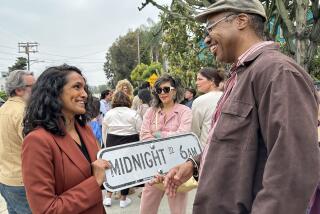Sex Businesses Have Residents, Police Seeing Red : Court rulings have set off a wave of nude bars, adult video stores, sometimes near homes and schools.
- Share via
PORTLAND, Ore. — Fed by liberal court interpretations of the state constitution, the mild-mannered city of Portland, Ore., now has more nude dancing bars per capita than any other U.S. city, local police say.
The bars, along with adult video stores and topless shoeshine emporiums, are overflowing traditional downtown locations into neighborhood commercial strips, where they can be found near libraries and homes. Outraged residents, churches and schools are pushing for greater restrictions, but they have run up against one of the most protective court interpretations of freedom of expression in the nation.
For the record:
12:00 a.m. Aug. 13, 1993 For the Record
Los Angeles Times Friday August 13, 1993 Home Edition Part A Page 3 Column 1 Metro Desk 1 inches; 26 words Type of Material: Correction
Mayor’s name--Because of a transcription error, a story on nude dancing that appeared in Thursday’s editions misspelled the name of the mayor of Portland, Ore. Her name is Vera Katz.
In 1987, the Oregon Supreme Court let stand a lower court ruling that overturned a Portland ordinance banning nude dancing in bars. The appeals court held that the ordinance was overly broad and violated the state constitution’s protection of free expression.
In 1988, the state Supreme Court struck down a Portland zoning law dealing with the location of an adult bookstore on the same grounds. Since then, local officials have claimed that they are unable to regulate the strip joints.
In effect, Oregon’s courts have said that “no law shall be passed” restraining freedom of expression, said one state legal observer. “No other state has taken that kind of comprehensive analysis.”
“The sex businesses can go anywhere other sales and services are allowed,” said Nancy Weiss of Portland’s planning department.
The result has been a remarkable proliferation of clubs and sex-oriented businesses in the state. While no exact dollar figures are available, the sex industry in Oregon “is as big as the ski and wine industry,” according to Phil Yoder, who publishes a guide to exotic entertainment in the state. Skiing and wine are major revenue producers for Oregon.
More than 50 nude dancing bars operate in and around this city of 440,000 people.
In the suburban eastern part of Portland, the Executive Tanning Salon, where men meet one-on-one with a nude dancer and then lie on bronzing tables or have their hair washed by lingerie-clad attendants, sits between a public library and a single-family home. A few doors down is the Peep Hole adult video and bookstore.
Residents have howled and picketed, protesting that their property values will go down and their safety will be endangered.
Maxine Myre, who lives in central Portland, said: “We can’t sell our home,” because a nude bar had moved in nearby. “Who wants to buy across from naked dancing. It is devastating to us. Our little home is all we have.”
Portland police detectives say prostitution has moved off the street and into the bars and sex shops. In testimony earlier this year before the state Legislature, Portland officers said the crime rate was considerably higher near sex businesses. Owners and dancers deny such claims, but some recent incidents have provoked public outrage. In one incident, a 12-year-old girl was abducted from her public school and raped in an adult motel across the street.
So far, lawmakers have not managed to pass any comprehensive measure to control the growing industry. The biggest hope of opponents of the sex businesses was a bill in the Legislature that would have placed a constitutional amendment on the state ballot to allow municipalities to zone the businesses 1,000 feet from residences and schools. The bill died in a conference committee from lack of action. Legislators will try again at their next session in 1995.
Portland Mayor Vera Hatz said she supports the measure but the city has taken no official stand, citing constitutional issues.
Meanwhile, appetite for the bars and shops apparently is still growing, although some industry experts say they expect a saturation point will be reached soon. Portland police say most of the clientele are Oregon residents, although some advertising for the clubs has filtered into Washington and California.
More to Read
Sign up for Essential California
The most important California stories and recommendations in your inbox every morning.
You may occasionally receive promotional content from the Los Angeles Times.













